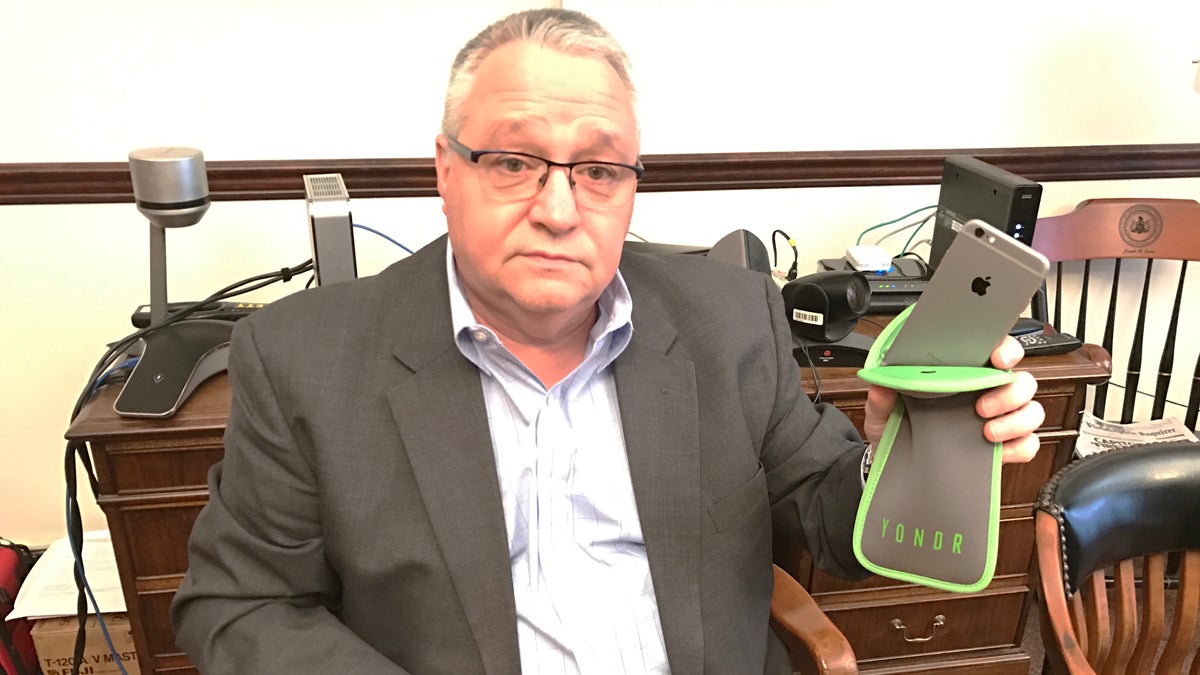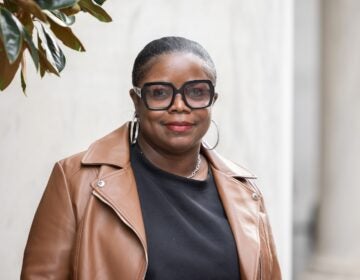Pouch protocol aims to keep cellphones holstered at Philly criminal courthouse
Listen
Joseph Evers, First Judicial District Court administrator, says, starting in April, most visitors to Philadelphia's criminal courthouse will have to put their phones in a locked pouch. (Bobby Allyn/WHYY)
If you’re planning a visit to Philadelphia’s criminal courthouse, then also plan on another thing: having your phone locked up.
As of way of combating what city court administrators see as open-court cell phone abuse, most visitors to Juanita Kidd Stout Center for Criminal Justice will have to hand over their phones to sheriff’s deputies, who will place the phones in form-fitting lockable pouches. When visitors leave, they will give the pouches back to an officer, who will unlock them and hand the phones back.
“Phones, as you well know, you can put them on silent. You can stick them in your pocket and record someone, and not even touch the phone. This prevents that from happening,” said Joseph Evers, court administrator for the First Judicial District.
Court officials hope the new policy, which starts April 3, will reduce instances of witness intimidation and deal with the problem of phones ringing during a court proceeding.
Some courtroom visitors have surreptitiously snapped photos of undercover police officers or witnesses and then posted them around Philadelphia neighborhoods, officials said.
“There’s a lot of instances where witnesses don’t show up,” Evers said. “They may never say that they were intimidated. We may, in fact, eliminate some of that when people are more safe in a court room.”
Already, the new policy has provoked criticism from some others in the legal community.
Philadelphia civil rights attorney Paul Hetznecker said the pouch protocol is a solution in search of a problem.
“It’s not as if there’s been a slew of cases where people have taken photographs and been charged with trying to intimidate witnesses on the stand. It just hasn’t happened,” Hetznecker said.
Most judges already ban cellphone use during court, Hetznecker pointed out, so forcing people to place their cellphones in a tamper-proof pouch is an over-correction.
“To deprive everyone that comes to the courthouse — which is a public building, it’s a public forum — the right to communicate with family members or witnesses or others, I think it’s really an overkill,” he said. “My phone isn’t locked up when I go to City Hall.”
Evers said a device that magnetically unlocks the pouches will be in every courtroom, and a phone can be removed from the soft package at the judge’s request. Also, some court visitors — including judges, attorneys, law enforcement officials, court staff and journalists — will not have to pouch their phones.
Comic inspiration
The whole pouch idea hit Evers after attending a David Chappelle show in Valley Forge. At the door, audience members had to slip their phones into an anti-phone pouch made by the San Francisco-based company Yondr, which has partnered with Guns N’ Roses, Alicia Keys, comedian Louis CK and others to prevent cellphone use at their shows. Artists say the practice allows them to be more relaxed during shows and forces the audience to pay attention.
Not too long after seeing Chappelle, Evers talked about the pouch idea with judges, police officers and other court officials, and then he placed an order for 4,500 of the pouches to be delivered to Philadelphia. A spokesman for the pouch company Yondr said Philadelphia is the first court system to adopt them. (A handful of courts in Texas use the pouches, but just for jurors.)
But expect to see them used more widely across the commonwealth, Evers said. He was recently at a conference of court administrators, where there was high interest in pouching cellphones in other courtrooms.
“Maybe, actually, watching a court proceeding and not texting will get you more interested in what’s going on,” Evers said.
Court of Common Pleas President Judge Sheila Woods-Skipper has endorsed the new policy.
“While we realize there may be some concerns about the new restrictions, we believe we have found a realistic way to increase safety in our courthouse without placing too much of a burden on the people we serve,” she said.
Outside of a courtroom on Thursday, though, reactions to the pouches were far less glowing.
“They want all the criminals to have the pouches, but no cops? That ain’t right,” said Jamill Richardson, 24.
Cheryl Tyler, 52, who was just leaving a hearing, had this response to the new pouch policy.
“Oh nah, I don’t want my phone in no pouch,” Tyler said. “Because my pouch might get mixed up with somebody else’s pouch, then they’re going off with my phone.”
WHYY is your source for fact-based, in-depth journalism and information. As a nonprofit organization, we rely on financial support from readers like you. Please give today.




